Climate change is having a substantial impact on the travel industry, with a significant portion of travelers believing that the damage from climate change has already occurred. A survey found that a majority of travelers believe that climate change is a pressing issue, with many placing responsibility for combating climate change on governments and travel companies. There is a growing focus on sustainability in travel preferences, with many travelers expressing their intention to travel more sustainably in the future. Additionally, extreme weather events, influenced by climate change, are altering travel patterns as travelers now consider these events when planning trips. As a result, there is an increasing demand from customers for more sustainable travel choices, presenting both challenges and opportunities for the industry.
Climate change could impact the number of days travelers are able to spend outdoors around the world, with destinations such as the Dominican Republic, Mexico, and India expected to experience a sharp reduction in “outdoor days” by the end of the century. This trend may lead to a concept known as “last-chance tourism,” where travelers visit destinations under threat by climate change before they disappear. Authorities in Chamonix, France, believe a new gondola will make it easier to visit the Mer de Glace, a melting glacier, with the hope that exposure to the fragile glacier could inspire people to live greener. However, some argue that increased visitor numbers could contribute to the destruction of fragile ecosystems, highlighting the delicate balance between tourism and conservation efforts.
Some travelers are taking action to help preserve natural wonders threatened by climate change, such as the Great Barrier Reef. Tour operators are offering opportunities for visitors to assist in replanting corals and monitoring coral health and nurseries. The aviation industry is also seeking ways to reduce its impact on climate change, with a focus on contrails, which contribute to increased CO2 emissions. Airlines are collaborating with researchers to find ways to operate flights that do not create contrails, potentially reducing their overall environmental impact. However, concerns remain about the unintended consequences of efforts to reduce CO2 emissions, as changes in aviation design could lead to an increase in contrails.
In response to the growing impact of climate change, a number of destinations are introducing new taxes to help mitigate its effects. Greece is charging visitors a “climate crisis resilience fee,” while Iceland has reinstated a tax on tourists staying in hotels and other accommodations. The revenue generated from these taxes is intended to fund initiatives aimed at fighting climate change. Overall, the travel industry is facing significant challenges due to climate change, but there are also opportunities for innovation and the development of more sustainable travel options. By adapting to the changing landscape of travel preferences and patterns influenced by climate change, businesses can contribute to a more environmentally conscious future for the industry.


